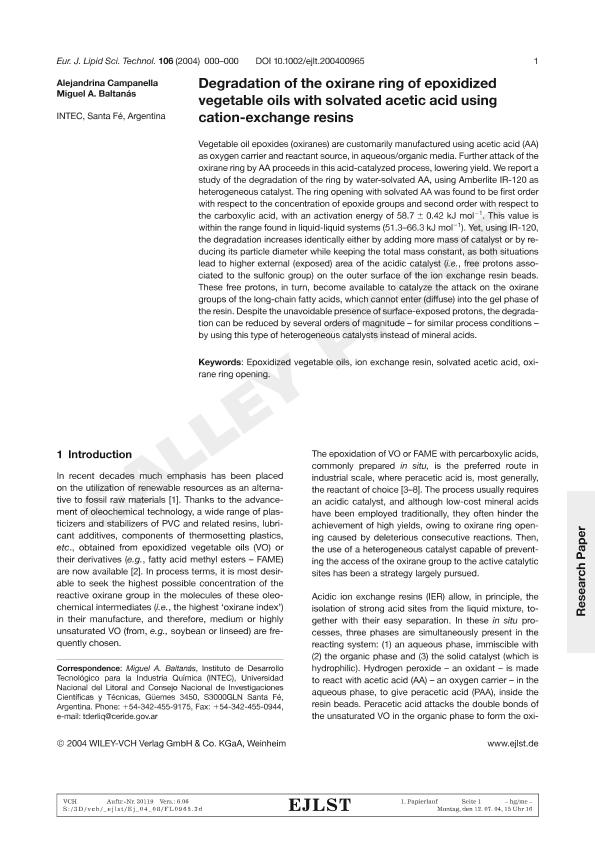Mostrar el registro sencillo del ítem
dc.contributor.author
Campanella, Alejandrina

dc.contributor.author
Baltanas, Miguel Angel

dc.date.available
2017-10-31T19:17:08Z
dc.date.issued
2004-05
dc.identifier.citation
Campanella, Alejandrina; Baltanas, Miguel Angel; Degradation of the Oxirane Ring of Epoxidized Vegetable Oils with Solvated Acetic Acid Using Cation-exchange Resins; Wiley VCH Verlag; European Journal of Lipid Science and Technology; 106; 8; 5-2004; 524-530
dc.identifier.issn
1438-7697
dc.identifier.uri
http://hdl.handle.net/11336/27279
dc.description.abstract
Vegetable oil epoxides (oxiranes) are customarily manufactured using acetic acid (AA) as oxygen carrier and reactant source, in aqueous/organic media. Further attack of the oxirane ring by AA proceeds in this acid-catalyzed process, lowering yield. We report a study of the degradation of the ring by water-solvated AA, using Amberlite IR-120 as heterogeneous catalyst. The ring opening with solvated AA was found to be first order with respect to the concentration of epoxide groups and second order with respect to the carboxylic acid, with an activation energy of 58.7 ± 0.42 kJ mol-1. This value is within the range found in liquid-liquid systems (51.3–66.3 kJ mol-1). Yet, using IR-120, the degradation increases identically either by adding more mass of catalyst or by reducing its particle diameter while keeping the total mass constant, as both situations lead to higher external (exposed) area of the acidic catalyst (i.e., free protons associated to the sulfonic group) on the outer surface of the ion exchange resin beads. These free protons, in turn, become available to catalyze the attack on the oxirane groups of the long-chain fatty acids, which cannot enter (diffuse) into the gel phase of the resin. Despite the unavoidable presence of surface-exposed protons, the degradation can be reduced by several orders of magnitude – for similar process conditions – by using this type of heterogeneous catalysts instead of mineral acids.
dc.format
application/pdf
dc.language.iso
eng
dc.publisher
Wiley VCH Verlag

dc.rights
info:eu-repo/semantics/openAccess
dc.rights.uri
https://creativecommons.org/licenses/by-nc-sa/2.5/ar/
dc.subject
Epoxidized Vegetable Oils,
dc.subject
Ion Exchange Resin,
dc.subject
Solvated Acetic Acid,
dc.subject
Oxirane Ring Opening.
dc.subject.classification
Otras Ingeniería Química

dc.subject.classification
Ingeniería Química

dc.subject.classification
INGENIERÍAS Y TECNOLOGÍAS

dc.title
Degradation of the Oxirane Ring of Epoxidized Vegetable Oils with Solvated Acetic Acid Using Cation-exchange Resins
dc.type
info:eu-repo/semantics/article
dc.type
info:ar-repo/semantics/artículo
dc.type
info:eu-repo/semantics/publishedVersion
dc.date.updated
2017-10-30T18:44:22Z
dc.journal.volume
106
dc.journal.number
8
dc.journal.pagination
524-530
dc.journal.pais
Alemania

dc.journal.ciudad
Weinheim
dc.description.fil
Fil: Campanella, Alejandrina. Consejo Nacional de Investigaciones Científicas y Técnicas. Centro Científico Tecnológico Conicet - Santa Fe. Instituto de Desarrollo Tecnológico para la Industria Química. Universidad Nacional del Litoral. Instituto de Desarrollo Tecnológico para la Industria Química; Argentina
dc.description.fil
Fil: Baltanas, Miguel Angel. Consejo Nacional de Investigaciones Científicas y Técnicas. Centro Científico Tecnológico Conicet - Santa Fe. Instituto de Desarrollo Tecnológico para la Industria Química. Universidad Nacional del Litoral. Instituto de Desarrollo Tecnológico para la Industria Química; Argentina
dc.journal.title
European Journal of Lipid Science and Technology

dc.relation.alternativeid
info:eu-repo/semantics/altIdentifier/doi/http://dx.doi.org/10.1002/ejlt.200400965
dc.relation.alternativeid
info:eu-repo/semantics/altIdentifier/url/http://onlinelibrary.wiley.com/doi/10.1002/ejlt.200400965/abstract
Archivos asociados
